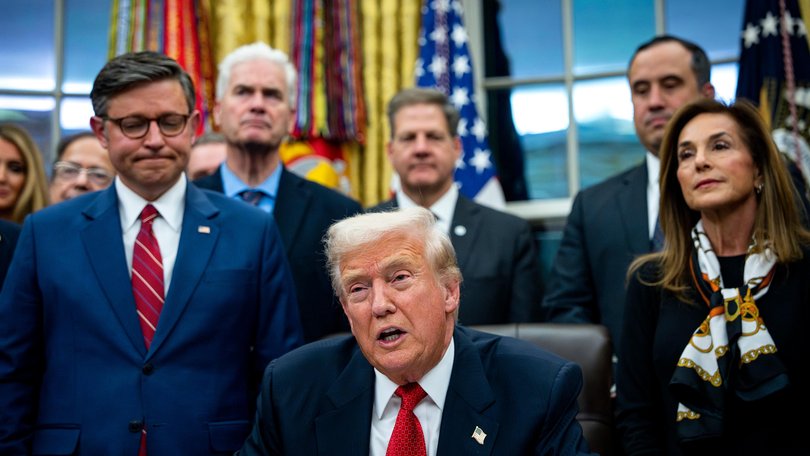THE NEW YORK TIMES: US Government reopens as Trump signs Bill to end nation’s longest shutdown

The US federal government began reopening Wednesday night, local time, after President Donald Trump signed into law a spending package that narrowly passed the House, ending the longest shutdown in the nation’s history.
Earlier, the House voted 222-209 on Day 43 of the shutdown and days after eight senators in the Democratic caucus broke their own party’s blockade and joined Republicans in allowing the spending measure to move forward, prompting a bitter backlash in their ranks. It was the first time the House had held a vote in nearly two months, after an extended recess during the shutdown.
“I just want to tell the American people, you should not forget this,” Mr Trump said, imploring voters to remember the shutdown when they go to vote in the midterms. Polling, however, shows most Americans blame Republicans for the shutdown.
Sign up to The Nightly's newsletters.
Get the first look at the digital newspaper, curated daily stories and breaking headlines delivered to your inbox.
By continuing you agree to our Terms and Privacy Policy.Some programs such as food stamps, or the Supplemental Nutrition Assistance Program, could be restored within hours, while other effects could take longer to unravel.
Six Democrats joined Republicans in approving the bill. Only two Republicans voted against it, Representatives Thomas Massie of Kentucky and Greg Steube of Florida.
Earlier in the day, Mr Trump’s budget office championed it in a statement as devoid of “any of the partisan, ‘poison pill’ provisions demanded by the Democrats.”
That was a reference to what had been Democrats’ chief demand in the shutdown fight, the extension of federal health care subsidies set to expire at the end of the year. Most congressional Republicans strongly oppose such an extension. And while Mr Trump had initially shown a flash of interest in brokering a bipartisan deal on the issue, as the shutdown dragged on he made it clear that he had no interest in negotiating.
His refusal to do so ultimately led a critical group of Democrats in the Senate to conclude that with hundreds of thousands of federal workers furloughed, millions of Americans at risk of losing food assistance and millions more facing air-travel disruptions, it was time to find an off-ramp from the shutdown.
In the House, the six Democrats who voted to reopen the government were Representatives Adam Gray of California; Marie Gluesenkamp Perez of Washington; Jared Golden of Maine; Henry Cuellar of Texas; Tom Suozzi of New York; and Don Davis of North Carolina. All represent swing districts.
“History reminds us that shutdowns never change the outcome, only the cost paid by the American people,” said Tom Cole, an Oklahoma Republican representative, who chairs the Appropriations Committee. “Over the last 43 days, the facts did not shift, the votes required did not shift and the path forward did not change.”
The Democratic defections in the Senate prompted outrage among House Democrats who, like most of their colleagues in the Senate, said their party should have held together firmly against any government funding bill that failed to address health care costs.
“We have federal workers across the country that have been missing paychecks,” Representative Alexandria Ocasio-Cortez, the New York Democrat, said. “We have SNAP recipients, millions of SNAP recipients across the country whose access to food stability was imperilled, and we have to figure out what that was for.”
Ms Ocasio-Cortez said the Trump administration had inflicted “cruelty” on the American people during the shutdown, including by trying to halt full federal funding for food stamps.
“We cannot enable this kind of cruelty with our cowardice,” she said.
Having elevated the health care subsidies as a political issue, Democrats are eager to keep the pressure on Republicans to extend them or face the consequences from voters who polls show overwhelmingly want to see them protected.
Democrat leader Hakeem Jeffries said he and other party leaders would file a discharge petition — a procedural manoeuvre to steer around the leadership and force a bill to the floor — to extend the subsidies for three years. Such a measure is unlikely to pick up much Republican support.
“There are only two ways this fight will end,” Mr Jeffries said on the House floor. “Either Republicans finally decide to extend the Affordable Care Act tax credits this year. Or the American people will throw Republicans out of their jobs next year and end the speakership of Donald J. Trump once and for all.”
The compromise measure the House approved Wednesday includes a spending package that would fund the government through January, as well as three separate spending bills to cover programs related to agriculture, military construction, veterans and legislative agencies for most of 2026.
The package includes a provision that would reverse layoffs of federal workers made during the shutdown and ensure retroactive pay for those who have been furloughed.
And it includes a measure that would provide a wide legal avenue for Republican senators whose phone records were seized as part of the investigation by Jack Smith, the former special counsel, into the attack on the Capitol on January 6, 2021, to sue the government for at least $US500,000 each.
That provision was quietly slipped into the spending deal by Senate leaders, and provoked wide, bipartisan ire among House lawmakers who have said they are looking for future avenues to strike it down. If they had sought to take it out of the spending deal, it would have prolonged the shutdown, because any changes the House made would have sent the measure back to the Senate for final approval.
Republican representative for Texas Chip Roy, a conservative who was one of the Biden Justice Department’s harshest critics, said it was “beside my comprehension that this got put in the bill, and it is why people have such a low opinion of this town.”
Speaker Mike Johnson said Wednesday before the vote that House Republicans would introduce legislation to repeal that provision, and would fast-track the measure for a vote as early as next week.
This article originally appeared in The New York Times.
© 2025 The New York Times Company
Originally published on The New York Times
